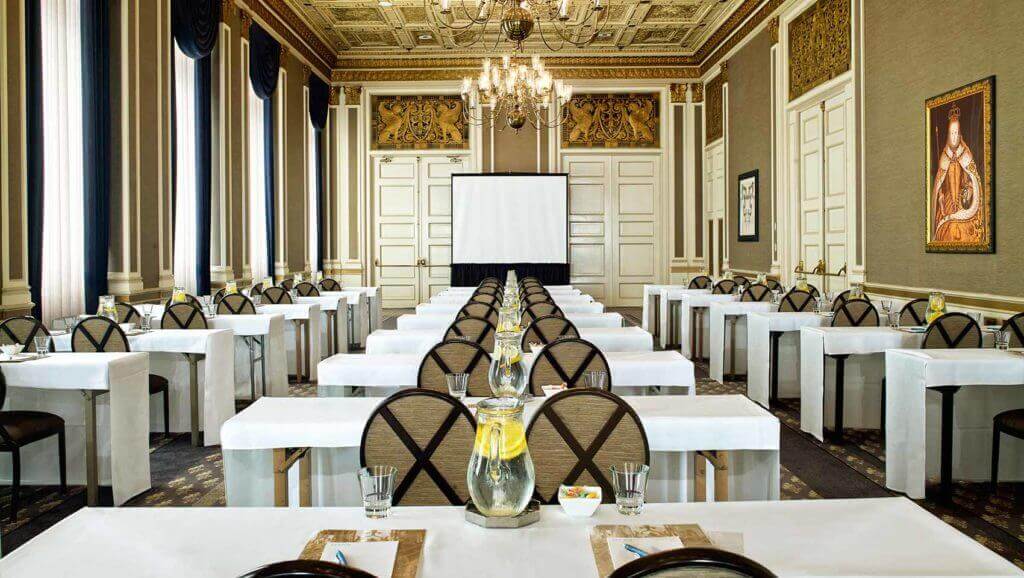
Meetings and conferences generate big business for hotels. The pandemic made a big mess of that. On the rebound, hoteliers are eager to see that demand segment return.
NB: This is an article from HotStats
The arrival of COVID-19 vaccines—coupled with a societal eagerness to get out of the house—has led to a relatively robust bounce in leisure travel, which helped underpin a listless hospitality business. Add Zoom fatigue of workers to the list of travel motivators and the return of medium-sized and large-scale gatherings aren’t too far behind.
Subscribe to our weekly newsletter and stay up to date
That’s good news for hotels, as properties suffered massive losses due to the near evaporation of group business last year. Pre-pandemic, when hotels were riding high, total conference and banquet RevPAR (excluding rooms) for 2019 in North America was $40.15. That revenue source fell to $9.28 in 2020. Simultaneously, conference volume mix percentage dropped nearly 30 percentage points from its height in January 2020 to a low of 10.1% in December 2020.

In Europe, total conference and banquet RevPAR (excluding rooms) was down 77.8% in 2020 compared to 2019.
Meanwhile, China saw a noticeable bounce in conference volume mix percentage in November 2020, almost matching the November 2019 number, before trailing off to a low of 16.2% in February 2021.

Source: HotStats
Welcome Meetings Back
But are hotels ready to welcome back meetings? Marriott and Hilton think so. Both companies established vigorous cleaning protocols for all spaces at their properties during the pandemic, and they’ve created programs to help meeting planners get back to business.
Marriott’s meeting-centric Gaylord brand is assisting planners with arranging COVID testing and health screenings, before and during meetings, as well as on-site temperature checks.
Hilton is offering planners flexibility on pricing, space and contract terms; particular responsiveness to customers’ needs, with offerings such as simplified contracts for small meetings; and, broadly described, the company promises to work closely with clients to address health and environmental concerns, with measures such as creating physically distanced meeting sets, as well as sharing environmental impact practices.

Source: HotStats
Sustainability is, in fact, an area that has become even more important to group customers over the past year, as have other long-standing societal issues, said Sarah Shewey, founder and CEO of Happily, a network of more than 1,000 freelance meeting and event planners.
“Last year was an incredible perfect storm, and us all being home in our own spaces, and slowing down, has given us time to reflect on priorities,” she said. “Our stakeholders and guests require a greater level of detail in reporting on safety, sustainability and diversity programs from us and our vendor partners than ever before.”
In their post-pandemic return to hotels, planners also will be seeking unconventional spaces, Shewey added. “We’ll be looking at how many different places we have to activate a group. For example, do we have outdoor spaces to work with? Is there more indoor meeting space for, say, six to 10 attendees?”
Guest Protection
In terms of protecting meeting attendees from COVID-19, there’s more work to be done, Shewey said. “We want to know hotels’ contract tracing and quarantine policies for employees and other groups. We are finding that some properties are allowing frontline workers who contracted the virus to go back to work three to seven days later, but it should be at least 14 days. And if we’re not doing a full buyout, and others are using the same facilities, we want to know about that.”
Both Marriott and Hilton adhere to local health department and current public health guidelines, including the notification of authorities when a worker gets sick.
But meeting organizers are seeking out properties that go over and above what’s expected, Shewey stated. “I’m hoping hotels can enforce compliance of best practices and take it more seriously than what’s required, rather than skate around regulations. That’s how you get around the risk, by doing more than required.”
For meetings to return, she asserted, “Hotels would be wise to err on the side of a higher level of precaution.”




